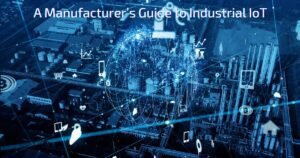The Industrial Internet of Things (Industrial IoT) represents a paradigm shift in manufacturing, combining digital technologies with traditional industrial processes to create smarter, more efficient operations. As manufacturers face increasing pressure to optimize production, reduce costs, and enhance sustainability, Industrial IoT emerges as a critical solution for achieving these objectives.
By 2028, the European Industrial IoT market is projected to reach $124.80 billion, with a compound annual growth rate (CAGR) of 12.66% from 2024-2028. This unprecedented growth reflects the technology’s transformative potential across manufacturing sectors.
What is Industrial IoT?
Defining Industrial IoT
Industrial IoT refers to the application of Internet of Things technology specifically within industrial environments and manufacturing processes. Unlike consumer IoT devices, Industrial IoT systems prioritize reliability, security, and operational efficiency through machine-to-machine (M2M) communication, advanced data analytics, and machine learning capabilities.
The technology creates a network of connected machinery, sensors, and devices that continuously collect, analyze, and act upon operational data. This interconnected ecosystem enables manufacturers to make data-driven decisions, automate processes, and optimize performance across entire production lines.
Industrial IoT Market Growth
Global IoT device deployment is expected to reach over 29 billion devices by 2030, nearly doubling from 15.1 billion in 2020. This explosive growth demonstrates the widespread adoption of connected technologies across industries, with manufacturing leading the charge in Industrial IoT implementation.
Key Technologies Powering Industrial IoT
Essential Hardware Components
Sensors and Actuators
- Environmental monitoring sensors capture temperature, humidity, pressure, and vibration data
- Actuators enable automated responses to sensor inputs
- Smart sensors with built-in processing capabilities reduce latency
Industrial Automation Devices
- Programmable Logic Controllers (PLCs) manage industrial processes
- Industrial robots perform complex tasks with precision
- RFID tags enable real-time asset tracking and inventory management
Data Collection Systems
- Barcode scanners streamline inventory management and financial reporting
- Torque drivers collect precise torque application data
- 3D printers enable rapid prototyping and on-demand manufacturing
Advanced Technologies
Edge Computing Infrastructure Edge computing processes data locally, reducing latency and bandwidth requirements while enabling real-time decision-making at the source of data generation.
Cloud Platforms and Analytics Cloud-based systems provide scalable storage and advanced analytics capabilities, enabling manufacturers to process vast datasets and extract actionable insights.
Emerging Technologies
- Augmented Reality (AR) and Virtual Reality (VR) enhance training and operational visualization
- Advanced cybersecurity solutions protect critical industrial networks
- Machine learning algorithms enable predictive analytics and autonomous optimization
Top 5 Benefits of Industrial IoT Implementation
1. Enhanced Operational Efficiency
Industrial IoT enables continuous monitoring and real-time analysis of manufacturing processes. Manufacturers can identify bottlenecks, optimize workflows, and reduce manual intervention through automated systems. This comprehensive visibility leads to increased throughput, reduced operating costs, and improved overall productivity.
Data-driven insights allow for dynamic process adjustments, ensuring optimal performance across all production stages. Automated reporting and analytics eliminate time-consuming manual data collection, freeing personnel for higher-value activities.
2. Predictive Maintenance Revolution
One of Industrial IoT’s most significant advantages lies in predictive maintenance capabilities. By analyzing sensor data from connected machinery, sophisticated algorithms identify patterns indicating potential equipment failures before they occur.
This proactive maintenance approach delivers multiple benefits:
- Reduced unplanned downtime by up to 50%
- Extended equipment lifespan through optimized maintenance schedules
- Lower maintenance costs through precise resource allocation
- Improved safety through early fault detection
3. Superior Quality Control
Industrial IoT provides unprecedented visibility into production quality through continuous monitoring and real-time analysis. Manufacturers can detect quality variations immediately and implement corrective actions before defective products reach customers.
Advanced quality control systems offer:
- Real-time process monitoring and adjustment
- Automated quality inspection using vision systems
- Reduced waste from defective products
- Enhanced customer satisfaction through consistent quality
- Compliance with industry standards and regulations
4. Supply Chain Optimization
Industrial IoT transforms supply chain management by providing end-to-end visibility across all stages. From raw material procurement to finished product delivery, connected systems enable seamless coordination and optimization.
Key supply chain improvements include:
- Real-time inventory tracking and automated reordering
- Optimized logistics and transportation routes
- Reduced lead times through better demand forecasting
- Enhanced supplier collaboration and communication
- Improved responsiveness to market changes
5. Energy Efficiency and Sustainability
Industrial IoT enables precise monitoring and control of energy consumption across manufacturing operations. By analyzing energy usage patterns, manufacturers can identify waste areas and implement targeted efficiency improvements.
Sustainability benefits include:
- Significant cost savings through reduced energy consumption
- Lower carbon footprint supporting environmental goals
- Compliance with environmental regulations
- Enhanced corporate social responsibility initiatives
Industrial IoT and Sustainable Manufacturing
Research indicates that IoT solutions could reduce global greenhouse gas emissions by 16.5% by 2030. According to ABB’s comprehensive study, 94% of respondents believe Industrial IoT “enables better decisions, improving overall sustainability,” while 57% report a “significant positive effect” on operational decision-making.
Sustainability Integration Challenges
Manufacturers face several challenges when integrating Industrial IoT with sustainable practices:
Financial Considerations
- Initial investment requirements for infrastructure upgrades
- Training costs for workforce development
- System integration complexity and associated expenses
Technical Challenges
- Legacy system compatibility issues
- Cybersecurity concerns and protection measures
- Data management and analytics capability development
Despite these challenges, the long-term benefits far exceed initial costs, positioning Industrial IoT as essential for sustainable manufacturing transformation.
Strategic Industrial IoT Integration
Implementation Framework
Successful Industrial IoT integration requires a comprehensive strategy tailored to each manufacturer’s specific needs and challenges. Organizations must consider existing infrastructure, workforce capabilities, and business objectives when developing implementation plans.
Phase 1: Assessment and Planning
- Evaluate current systems and identify integration opportunities
- Establish clear objectives and success metrics
- Develop cybersecurity protocols and data governance frameworks
Phase 2: Pilot Implementation
- Start with focused pilot projects to demonstrate value
- Train personnel on new technologies and processes
- Refine systems based on initial results and feedback
Phase 3: Scalable Deployment
- Expand successful pilots across broader operations
- Integrate systems for comprehensive data visibility
- Continuously optimize performance through analytics
Future Outlook
Industrial IoT adoption will continue accelerating as manufacturers recognize its transformative potential. The technology’s evolution toward more sophisticated analytics, artificial intelligence integration, and autonomous operations will create new opportunities for innovation and competitive advantage.
Organizations that embrace Industrial IoT today position themselves as industry leaders, capable of adapting to changing market conditions and customer expectations. By fostering innovation cultures and staying current with technological developments, manufacturers can leverage Industrial IoT not merely to survive but to thrive in the new industrial landscape.
Frequently Asked Questions
What is the concept of Industrial IoT?
Industrial IoT connects industrial equipment to the internet for data analysis and exchange, enhancing productivity, automation, and decision-making in industries including manufacturing, energy, and logistics.
What distinguishes Industrial IoT from consumer IoT?
While consumer IoT focuses on convenience and lifestyle enhancement through devices like smart home equipment and wearables, Industrial IoT addresses industrial and manufacturing processes to improve efficiency, safety, and reliability through robust data collection, analysis, and automation systems.
What are the primary benefits of Industrial IoT?
Industrial IoT delivers transformative advantages including supply chain optimization, enhanced quality control, predictive maintenance, operational efficiency, and energy efficiency. These benefits combine to create significant competitive advantages for manufacturing organizations.
How do AI and Industrial IoT work together?
Artificial Intelligence serves as the system’s analytical brain, while Industrial IoT functions as the digital nervous system collecting data. Together, they create AIoT (AI + IoT), enabling enhanced analytics, autonomous decision-making, and intelligent data processing across manufacturing operations.
Why should organizations adopt Industrial IoT?
Industrial IoT enables comprehensive digitalization of manufacturing operations. By reducing manual processes through automation, machine learning, and big data analytics, manufacturers can minimize human error risks while maximizing operational efficiency and competitiveness.
Take Action: Transform Your Manufacturing with Industrial IoT
Ready to revolutionize your manufacturing operations with Industrial IoT? Contact our experts at AlsakrOnline to discover how our comprehensive Industrial IoT solutions can optimize your production processes, reduce costs, and enhance sustainability. Start your digital transformation journey today and position your organization for long-term success in the evolving industrial landscape.





